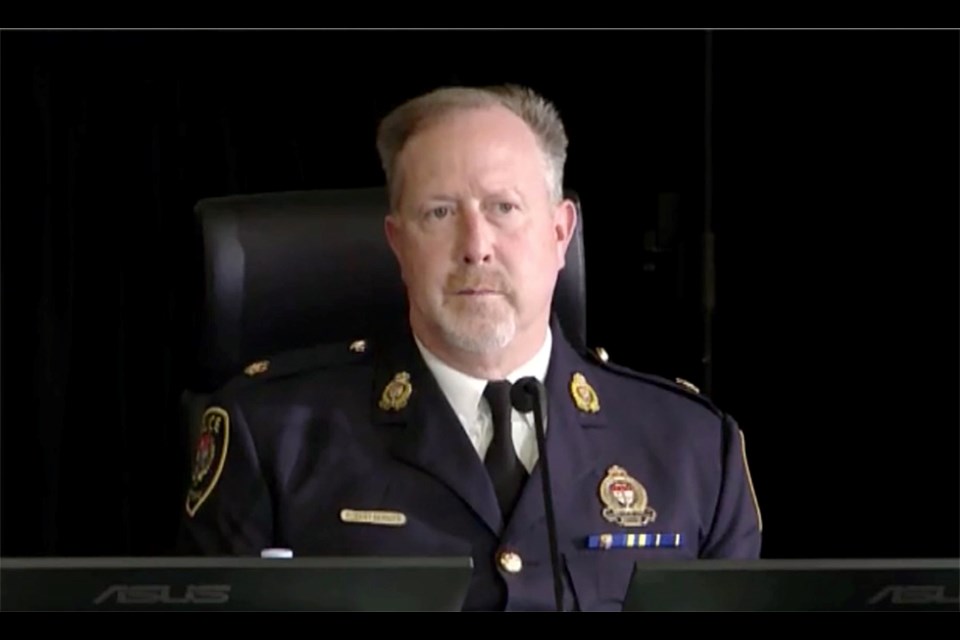OTTAWA – The Emergencies Act wasn’t necessary to help police clear Ottawa’s streets during protests in January and February, testified Ottawa Police Service Superintendent Robert Bernier.
Bernier, who was the incident commander to deal with the Freedom Convoy, made this admission to lawyer Rob Kittredge from the Justice Centre for Constitutional Freedoms, under cross-examination at the Public Order Emergency Commission inquiry Wednesday.
The emergency powers may have been helpful to police in various ways but they were not necessary, Bernier agreed.
Bernier also admitted to Ewa Krajewska, counsel for Canadian Civil Liberties Association, that when he was preparing an operational plan between Feb. 10 and Feb. 13, the OPS had the necessary legal powers to execute the plan and reiterated that OPS didn’t need any additional legal tools or powers under the Emergencies Act.
“I would say [the Emergencies Act was] beneficial, but to say [the Emergencies Act powers] were necessary, I would say no,” testified Bernier.
He told the inquiry that the police were initially having challenges.
“We were having a hard time up until the 13th of February,” he said, but added, “As things materialized on the 13th I was satisfied we were good.”
Last week, OPS Deputy Chief Patricia Ferguson testified that tow trucks were headed to Ottawa on Oct. 13 to move the semi-trucks and vehicles blocking Ottawa’s streets without the use of the Act.
Bernier told Commission lawyers that his plan to clear Ottawa’s streets didn’t require the Emergencies Act.
“The plan I was developing was based on existing authorities whether it be under the provincial, federal or common law authority to act. I was satisfied that we were going to have all the authorities we would need to take action.”
City of Ottawa had reached deal with truckers
Days before Prime Minister Justin Trudeau invoked the Emergencies Act, the City of Ottawa had reached an agreement with convoy organizers to move trucks.
City of Ottawa Manager Steve Kanellakos testified at the inquiry last week that the City of Ottawa had made a breakthrough with convoy organizers on Feb. 12. He told the inquiry that convoy organizers were moving trucks out of residential areas as agreed in their negotiations.
A text message from Kanellakos to convoy lawyer Keith Wilson revealed that it wasn’t the truckers’ fault that the agreement fell apart.
Convoy lawyer Brendan Miller asked Kanellakos: “The Mayor’s vision for how this would work out all trucks other than ones on Wellington would be moved out of town and that protesters would be shuttled in on busses from camps outside of town on a go forward?”
Kanellakos replied, “We were told that was an option.”
Miller than asked, “It was the police that prevented the deal from being executed?”
Miller than asked, “It was the police that prevented the deal from being executed?”
Kanellakos replied, “My opinion it was a broader context of circumstances and that the invocation of the [Emergencies Act] created new legal framework around Parliament Hill in that red zone and the authorities decided to step back.”
He said it was either the Ottawa Police Service or the Parliamentary Protective Service that blocked the plan to move the trucks out of residential areas.
No safety concerns
The inquiry also revealed that an Ottawa Police Service intelligence officer’s briefing before the Freedom Convoy arrived in Ottawa indicated, “Their intention is to hold a peaceful demonstration and there is no indication of hostility.”
On Feb. 14 – the day the Emergencies Act was invoked - CSIS and Public Safety Canada internal memos both said there were no safety concerns.
The Government Operations Centre memo stated: “Approx 10 people on Parl Hill and approx. 100 on the surrounding streets.”
A CSIS memo said: “No concerns at this time.”
The Government Operations Centre’s overall assessment was that the "Majority of events have been peaceful. Since most government employees are working remotely the disruption to government activities is so far minor.”
Final report
The hearings started Oct. 13 and are expected to run until Nov. 25 with 65 witnesses being called. Witnesses include Prime Minister Justin Trudeau, Deputy Prime Minister and Finance Minister Chrystia Freeland, Public Safety Minister Marco Mendicino, Justice Minister David Lametti, as well as representatives from Ottawa Police, Ontario Provincial Police, CSIS, and lawyers from the Justice Centre for Constitutional Freedoms. Members of the trucker convoy and freedom movement will also testify, including Pat King, Tamara Lich, Tom Marazzo, and Chris Barber.
Public invited to participate
The public is invited to contact the commission. They can email [email protected] , or write Public Order Emergency Commission, c/o Main Floor Security Desk, 90 Sparks Street, Ottawa, ON K1A 0A3.
Submissions should be one or two pages, up to about five pages. The public may provide supporting materials, if any, as attachments.
The Commission accepts anonymous submissions but asks that you identify your country of residence. All submissions will be read and considered by the Commission, and your submission may be referred to or quoted by the Commission either in a written report or during the public hearings. No identifying information will be used without your express permission.
If you have any questions about sending comments please email your questions to [email protected]
— Click for more from Crime, Cops and Court.





